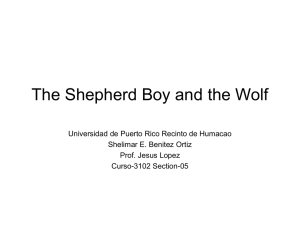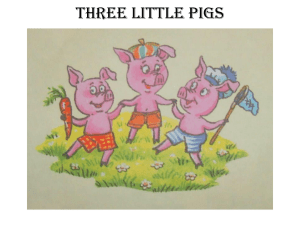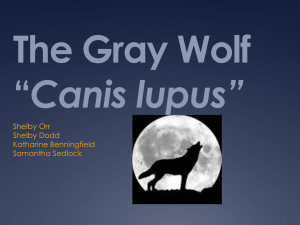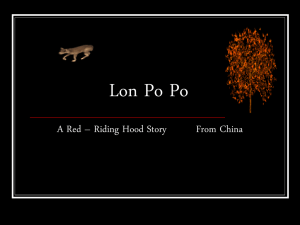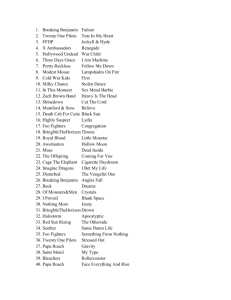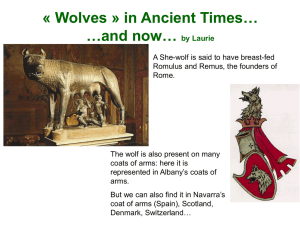Grimm`s Fairy Tales
advertisement
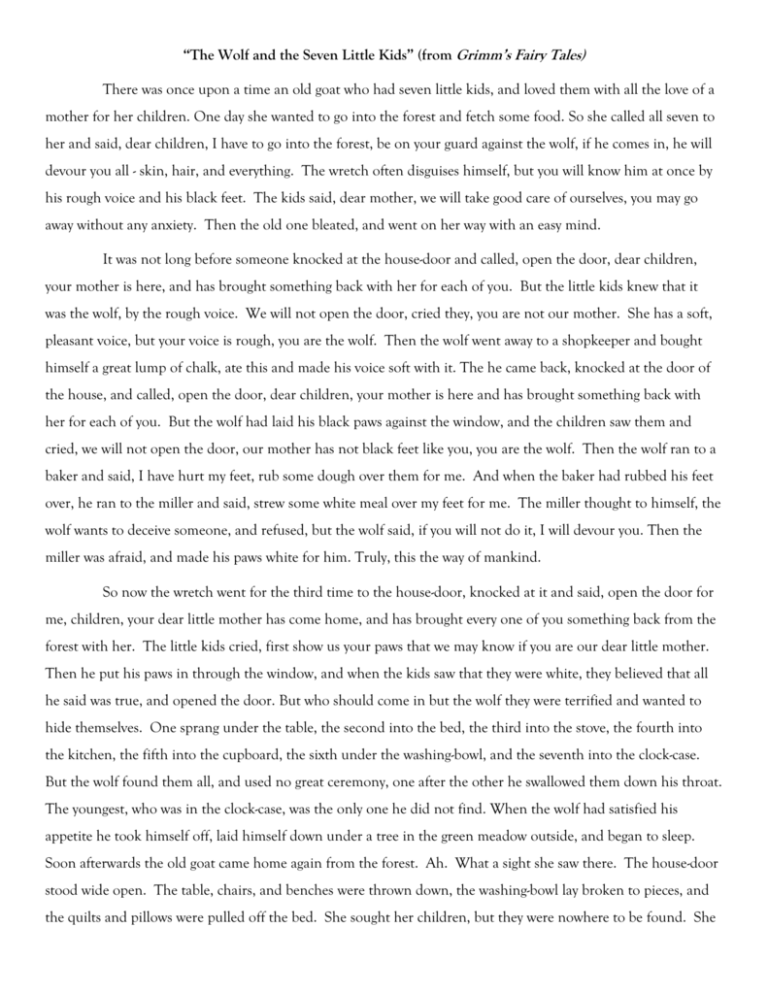
“The Wolf and the Seven Little Kids” (from Grimm’s Fairy Tales) There was once upon a time an old goat who had seven little kids, and loved them with all the love of a mother for her children. One day she wanted to go into the forest and fetch some food. So she called all seven to her and said, dear children, I have to go into the forest, be on your guard against the wolf, if he comes in, he will devour you all - skin, hair, and everything. The wretch often disguises himself, but you will know him at once by his rough voice and his black feet. The kids said, dear mother, we will take good care of ourselves, you may go away without any anxiety. Then the old one bleated, and went on her way with an easy mind. It was not long before someone knocked at the house-door and called, open the door, dear children, your mother is here, and has brought something back with her for each of you. But the little kids knew that it was the wolf, by the rough voice. We will not open the door, cried they, you are not our mother. She has a soft, pleasant voice, but your voice is rough, you are the wolf. Then the wolf went away to a shopkeeper and bought himself a great lump of chalk, ate this and made his voice soft with it. The he came back, knocked at the door of the house, and called, open the door, dear children, your mother is here and has brought something back with her for each of you. But the wolf had laid his black paws against the window, and the children saw them and cried, we will not open the door, our mother has not black feet like you, you are the wolf. Then the wolf ran to a baker and said, I have hurt my feet, rub some dough over them for me. And when the baker had rubbed his feet over, he ran to the miller and said, strew some white meal over my feet for me. The miller thought to himself, the wolf wants to deceive someone, and refused, but the wolf said, if you will not do it, I will devour you. Then the miller was afraid, and made his paws white for him. Truly, this the way of mankind. So now the wretch went for the third time to the house-door, knocked at it and said, open the door for me, children, your dear little mother has come home, and has brought every one of you something back from the forest with her. The little kids cried, first show us your paws that we may know if you are our dear little mother. Then he put his paws in through the window, and when the kids saw that they were white, they believed that all he said was true, and opened the door. But who should come in but the wolf they were terrified and wanted to hide themselves. One sprang under the table, the second into the bed, the third into the stove, the fourth into the kitchen, the fifth into the cupboard, the sixth under the washing-bowl, and the seventh into the clock-case. But the wolf found them all, and used no great ceremony, one after the other he swallowed them down his throat. The youngest, who was in the clock-case, was the only one he did not find. When the wolf had satisfied his appetite he took himself off, laid himself down under a tree in the green meadow outside, and began to sleep. Soon afterwards the old goat came home again from the forest. Ah. What a sight she saw there. The house-door stood wide open. The table, chairs, and benches were thrown down, the washing-bowl lay broken to pieces, and the quilts and pillows were pulled off the bed. She sought her children, but they were nowhere to be found. She called them one after another by name, but no one answered. At last, when she came to the youngest, a soft voice cried, dear mother, I am in the clock-case. She took the kid out, and it told her that the wolf had come and had eaten all the others. Then you may imagine how she wept over her poor children. At length in her grief she went out, and the youngest kid ran with her. When they came to the meadow, there lay the wolf by the tree and snored so loud that the branches shook. She looked at him on every side and saw that something was moving and struggling in his gorged belly. Ah, heavens, she said, is it possible that my poor children whom he has swallowed down for his supper, can be still alive. Then the kid had to run home and fetch scissors, and a needle and thread and the goat cut open the monster's stomach, and hardly had she make one cut, than one little kid thrust its head out, and when she cut farther, all six sprang out one after another, and were all still alive, and had suffered no injury whatever, for in his greediness the monster had swallowed them down whole. What rejoicing there was. They embraced their dear mother, and jumped like a sailor at his wedding. The mother, however, said, now go and look for some big stones, and we will fill the wicked beast's stomach with them while he is still asleep. Then the seven kids dragged the stones thither with all speed, and put as many of them into his stomach as they could get in, and the mother sewed him up again in the greatest haste, so that he was not aware of anything and never once stirred. When the wolf at length had had his fill of sleep, he got on his legs, and as the stones in his stomach made him very thirsty, he wanted to go to a well to drink. But when he began to walk and move about, the stones in his stomach knocked against each other and rattled. Then cried he, what rumbles and tumbles against my poor bones. I thought 'twas six kids, but it feels like big stones. And when he got to the well and stooped over the water to drink, the heavy stones made him fall in, and he had to drown miserably. When the seven kids saw that, they came running to the spot and cried aloud, the wolf is dead. The wolf is dead, and danced for joy round about the well with their mother. The Queen Bee (from Grimm’s Fairy Tales) Two kings' sons once went out in search of adventures, and fell into a wild, disorderly way of living, so that they never came home again. The youngest, who was called simpleton, set out to seek his brothers, but when at length he found them, they mocked him for thinking that he with his simplicity could get through the world, when they two could not make their way, and yet were so much cleverer. They all three traveled away together, and came to an ant-hill. The two elder wanted to destroy it, to see the little ants creeping about in their terror, and carrying their eggs away, but simpleton said, leave the creatures in peace, I will not allow you to disturb them. Then they went onwards and came to a lake, on which a great number of ducks were swimming. The two brothers wanted to catch a couple and roast them, but simpleton would not permit it, and said, leave the creatures in peace, I will not suffer you to kill them. At length they came to a bee's nest, in which there was so much honey that it ran out of the trunk of the tree where it was. The two wanted to make a fire beneath the tree, and suffocate the bees in order to take away the honey, but simpleton again stopped them and said, leave the creatures in peace, I will not allow you to burn them. At length the three brothers arrived at a castle where stone horses were standing in the stables, and no human being was to be seen, and they went through all the halls until, quite at the end, they came to a door in which were three locks. In the middle of the door, however, there was a little pane, through which they could see into the room. There they saw a little grey man, who was sitting at a table. They called him, once, twice, but he did not hear, at last they called him for the third time, when he got up, opened the locks, and came out. He said nothing, however, but conducted them to a handsomely-spread table, and when they had eaten and drunk, he took each of them to a bedroom. Next morning the little grey man came to the eldest, beckoned to him, and conducted him to a stone table, on which were inscribed three tasks, by the performance of which the castle could be delivered from enchantment. The first was that in the forest, beneath the moss, lay the princess's pearls, a thousand in number, which must be picked up, and if by sunset one single pearl was missing, he who had looked for them would be turned into stone. The eldest went thither, and sought the whole day, but when it came to an end, he had only found one hundred, and what was written on the table came true, and he was turned into stone. Next day, the second brother undertook the adventure, but it did not fare much better with him than with the eldest, he did not find more than two hundred pearls, and was changed to stone. At last it was simpleton's turn to seek in the moss, but it was so difficult for him to find the pearls, and he got on so slowly, that he seated himself on a stone, and wept. And while he was thus sitting, the king of the ants whose life he had once saved, came with five thousand ants, and before long the little creatures had got all the pearls together, and laid them in a heap. The second task, however, was to fetch out of the lake the key of the king's daughter's bed-chamber. When simpleton came to the lake, the ducks which he had saved, swam up to him, dived down, and brought the key out of the water. But the third task was the most difficult, from amongst the three sleeping daughters of the king was the youngest and dearest to be sought out. They, however, resembled each other exactly, and were only to be distinguished by their having eaten different sweetmeats before they fell asleep, the eldest a bit of sugar, the second a little syrup, and the youngest a spoonful of honey. Then the queen of the bees, whom simpleton had protected from the fire, came and tasted the lips of all three, and at last she remained sitting on the mouth which had eaten honey, and thus the king's son recognized the right princess. Then the enchantment was at an end, everything was delivered from sleep, and those who had been turned to stone received once more their natural forms. Simpleton married the youngest and sweetest princess, and after her father's death became king, and his two brothers received the two other sisters. The Singing Bone (from Grimm’s Fairy Tales) In a certain country there was once great lamentation over a wild boar that laid waste the farmer's fields, killed the cattle, and ripped up people's bodies with his tusks. The king promised a large reward to anyone who would free the land from this plague, but the beast was so big and strong that no one dared to go near the forest in which it lived. At last the king gave notice that whosoever should capture or kill the wild boar should have his only daughter to wife. Now there lived in the country two brothers, sons of a poor man, who declared themselves willing to undertake the hazardous enterprise, the elder, who was crafty and shrewd, out of pride, the younger, who was innocent and simple, from a kind heart. The king said, in order that you may be the more sure of finding the beast, you must go into the forest from opposite sides. So the elder went in on the west side, and the younger on the east. When the younger had gone a short way, a little man stepped up to him. He held in his hand a black spear and said, I give you this spear because your heart is pure and good, with this you can boldly attack the wild boar, and it will do you no harm. He thanked the little man, shouldered the spear, and went on fearlessly. Before long he saw the beast, which rushed at him, but he held the spear towards it, and in its blind fury it ran so swiftly against it that its heart was cloven in twain. Then he took the monster on his back and went homewards with it to the king. As he came out at the other side of the wood, there stood at the entrance a house where people were making merry with wine and dancing. His elder brother had gone in here, and, thinking that after all the boar would not run away from him, was going to drink until he felt brave. But when he saw his young brother coming out of the wood laden with his booty, his envious, evil heart gave him no peace. He called out to him, come in, dear brother, rest and refresh yourself with a cup of wine. The youth, who suspected no evil, went in and told him about the good little man who had given him the spear wherewith he had slain the boar. The elder brother kept him there until the evening, and then they went away together, and when in the darkness they came to a bridge over a brook, the elder brother let the other go first, and when he was half-way across he gave him such a blow from behind that he fell down dead. He buried him beneath the bridge, took the boar, and carried it to the king, pretending that he had killed it, whereupon he obtained the king's daughter in marriage. And when his younger brother did not come back he said, the boar must have ripped up his body, and every one believed it. But as nothing remains hidden from God, so this black deed also was to come to light. Years afterwards a shepherd was driving his herd across the bridge, and saw lying in the sand beneath, a snow-white little bone. He thought that it would make a good mouth-piece, so he clambered down, picked it up, and cut out of it a mouth-piece for his horn, but when he blew through it for the first time, to his great astonishment, the bone began of its own accord to sing – ah, friend thou blowest upon my bone. Long have I lain beside the water, my brother slew me for the boar, and took for his wife the king's young daughter. What a wonderful horn, said the shepherd, it sings by itself, I must take it to my lord the king. And when he came with it to the king the horn again began to sing its little song. The king understood it all, and caused the ground below the bridge to be dug up, and then the whole skeleton of the murdered man came to light. The wicked brother could not deny the deed, and was sewn up in a sack and drowned. But the bones of the murdered man were laid to rest in a beautiful tomb in the churchyard.


